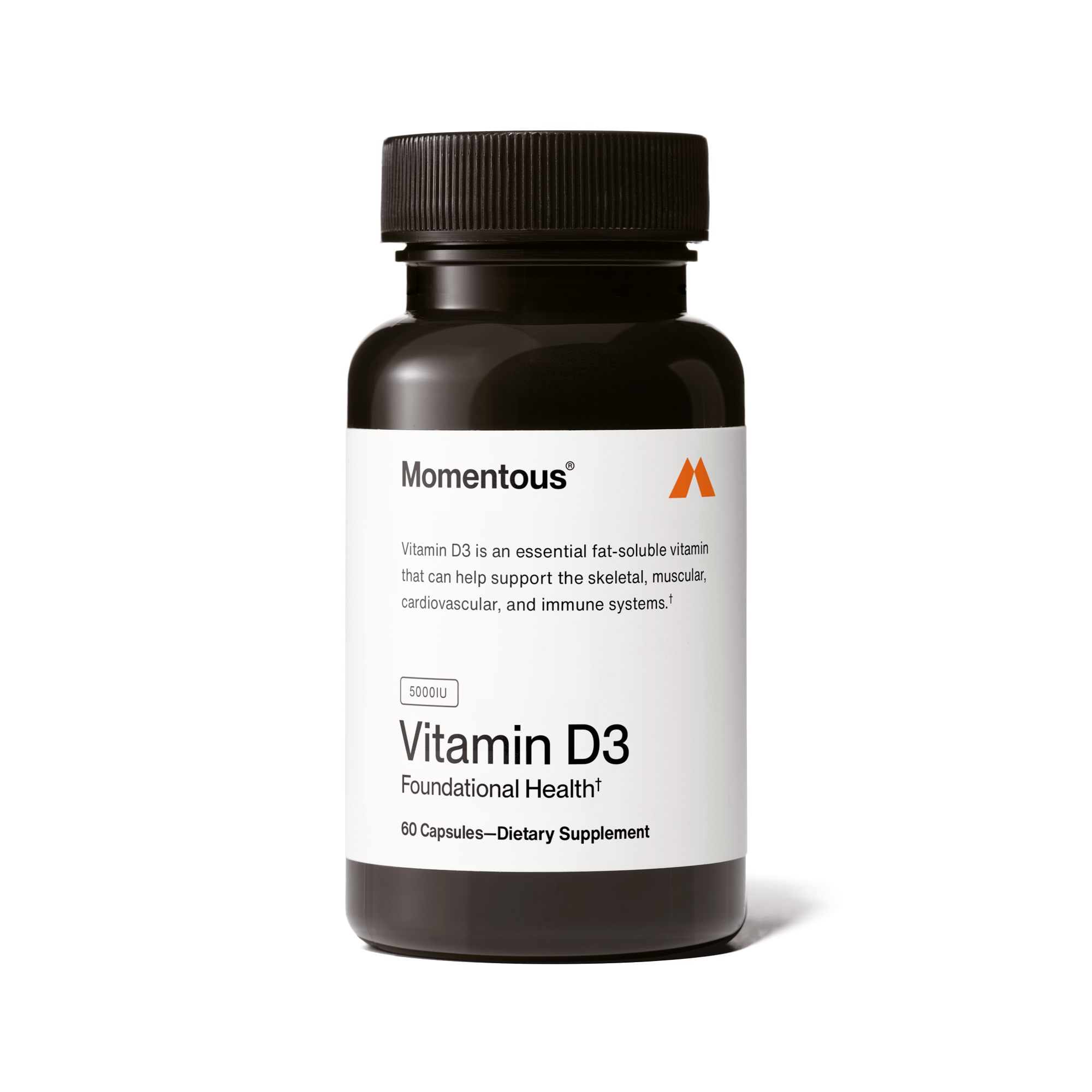High-strength D3 for bone + immune health
By Momentous
As we head into the winter in the northern hemisphere and daylight hours rapidly start to diminish it becomes more important than ever to get outside. Sunlight doesn't just make us feel good, it kickstarts a number of processes within the body. Did you know that most people are not getting enough sun exposure to produce sufficient levels of Vitamin D in their bodies? And even when we do get sun exposure, factors like sunscreen use, living in areas with less sunlight, and spending more time indoors all limit our body’s ability to produce Vitamin D. Despite being one of the most important nutrients for our bodies, many people are unaware of the benefits of Vitamin D or unsure if they’re even getting enough of it. In fact, studies have shown that a large percentage of the population, especially those living in colder climates or with limited sun exposure, are deficient in Vitamin D. This deficiency can lead to a host of health problems, including weakened bones, increased risk of illness and infections, and even depression.
However, by understanding the importance of Vitamin D and taking steps to incorporate it into your daily routine, you can enhance your health and well-being in a number of ways, from improving your athletic performance and recovery to boosting your immune function and sleep quality. Let’s explore the many benefits Vitamin D has to offer.
1. Improved muscle strength and power
Vitamin D supplementation may increase muscle performance in two ways: (i) improving cell growth and development, specifically of fast-twitch muscle fibers responsible for strength and power output; (ii) improving signal sensitivity from the brain to the muscle leading to faster and better muscular contraction.
What the research says:
- Increases in strength and power have been studied in athletes with positive results after an 8-week treatment of 5000 IU/day of Vitamin D3. The Vitamin D3 group had a significant improvement in both their 10m sprint times and vertical jump when compared to the placebo group.
- In another study where trials lasted from 4 weeks to 6 months, Vitamin D supplementation significantly increased muscle strength in both the upper and lower body.
2. Improved muscle recovery
Vitamin D plays a critical role in reducing inflammation due to its ability to inhibit the production of pro-inflammatory markers. Some of those markers are thought to be directly related to the resulting muscle damage from exercise.
What the research says:
- Higher pre-exercise Vitamin D levels are associated with faster recovery of skeletal muscle strength after an acute bout of intense exercise.
- In a study looking at peak force after intense exercise, the group supplementing Vitamin D only decreased by 6%, while the placebo's power decreased by 32%. The supplemental group also showed a blunted increase in muscle damage biomarkers after the exercise protocol.
- The Vitamin D supplementation group showed a 14% improvement at 48hrs and 13.7% improvement at 7 days in torque recovery. 88% of the variation in peak torque recovery could be explained by the change in serum Vitamin D levels.
3. Prevents stress fractures
Stress fractures account for almost 20% of all sports injuries. Vitamin D’s most well-known function is to support bone growth, remodeling and density by influencing calcium absorption. For athletes, weaker bones are more susceptible to stress fractures and even full fracture.
What the research says:
- In college athletes, the rate of recurrent stress fracture was 21.5% and accounted for 20.7% of season-ending injuries. Vitamin D3 supplementation was shown to significantly decrease stress fracture rate in college athletes.
- In tactical athletes, those with Vitamin D levels below 30ng/mL were 3.6 times more likely to develop stress fractures during training than those with sufficient levels.
4. Improved sleep quality
Quality sleep is a key component for a healthy lifestyle. At a high level, a lack of quality sleep impairs cognition, learning and mental well-being. Physically, it disrupts growth and repair of cells, glucose metabolism and lowers resistance to respiratory infection.
What the research says:
- Studies reporting global sleep quality show that 50–78% of elite athletes experience sleep disturbance and 22–26% suffer highly disturbed sleep.
- Those with Vitamin D deficiency have shown an increase in sleep disorder risk by up to 60%.
- Vitamin D supplementation has been shown to improve sleep quality, reduce sleep latency, raise sleep duration and improve subjective sleep quality.
5. Improved immune health
Vitamin D plays a key role in supporting immune function, specifically in the lungs where it helps the cell lining defend against pathogens like flu and COVID-19. It does this by activating immune cells that can both fight the infection as well as moderate the inflammatory response that comes with it. The benefit of higher Vitamin D levels is a more efficient response to infection as well as a potential to reduce the severity of symptoms.
What the research says:
- A recent meta-analysis found that up to 56% of athletes may have insufficient levels of vitamin D.
- Observational studies predominantly report significant associations between low Vitamin D status and increased risk of both upper and lower respiratory tract infections.
Whether you are getting your Vitamin D through sunlight or supplementing, it’s clear that it can have a profound impact on our health and well-being. Many people aren’t able to get as much sun exposure as they need to elicit these benefits. At Momentous we offer a Vitamin D supplement that was carefully designed to help you get the right amount of this critical nutrient even if you can’t get adequate sun exposure. Don’t let a lack of sunlight hurt your health. Find ways to safely get sun exposure and supplement as needed so you can reap the benefits offered by Vitamin D.







